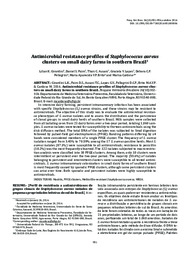Antimicrobial resistance profiles of Staphylococcus aureus clusters on small dairy farms in southern Brazil.
Antimicrobial resistance profiles of Staphylococcus aureus clusters on small dairy farms in southern Brazil.
Author(s): GIRARDINI, L. K.; PAIM, D. S.; AUSANI, THAIS C.; LOPES, G. V.; PELLEGRINI, D. C. P.; BRITO, M. A. V. P. e; CARDOSO, M.
Summary: In intensive dairy farming, persistent intramammary infection has been associated with specific Staphylococcus (S.) aureus strains, and these strains may be resistant to antimicrobials. The objective of this study was to evaluate the antimicrobial resistance phenotypes of S. aureus isolates and to assess the distribution and the persistence of clonal groups in small dairy herds of southern Brazil. Milk samples were collected from all lactating cows from 21 dairy farms over a two-year period, totaling 1,060 samples. S. aureus isolates were tested for susceptibility to thirteen antimicrobials using the disk diffusion method. The total DNA of the isolates was subjected to SmaI digestion followed by pulsed-field gel electrophoresis (PFGE). Banding patterns differing by ≤4 bands were considered members of a single PFGE cluster. The frequency of S. aureus isolation ranged from 3.45% to 70.59% among the 17 S. aureus-positive herds. Most S. aureus isolates (87.1%) were susceptible to all antimicrobials; resistance to penicillin (18.2%) was the most frequently observed. The 122 isolates subjected to macrorestriction analysis were classified into 30 PFGE-clusters. Among them, only 10 clusters were intermittent or persistent over the two-year period. The majority (93.6%) of isolates belonging to persistent and intermittent clusters were susceptible to all tested antimicrobials. S. aureus intramammary colonization in small dairy farms of southern Brazil is most frequently caused by sporadic PFGE clusters, although some persistent clusters can arise over time. Both sporadic and persistent isolates were highly susceptible to antimicrobials.
Publication year: 2016
Types of publication: Journal article
Unit: Embrapa Dairy Cattle
Observation
Some of Embrapa's publications are published as ePub files. To read them, use or download one of the following free software options to your computer or mobile device. Android: Google Play Books; IOS: iBooks; Windows and Linux: Calibre.
Access other publications
Access the Agricultural Research Database (BDPA) to consult Embrapa's full library collection and records.
Visit Embrapa Bookstore to purchase books and other publications sold by Embrapa.

